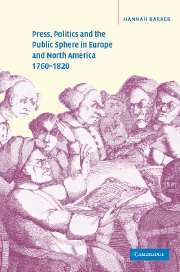Book contents
- Frontmatter
- Contents
- Notes on contributors
- Acknowledgements
- Introduction
- 1 The cosmopolitan press, 1760–1815
- 2 The Netherlands, 1750–1813
- 3 Germany, 1760–1815
- 4 England, 1760–1815
- 5 Ireland, 1760–1820
- 6 America, 1750–1820
- 7 France, 1750–89
- 8 The French revolutionary press
- 9 Italy, 1760–1815
- 10 Russia, 1790–1830
- Index
4 - England, 1760–1815
Published online by Cambridge University Press: 05 July 2009
- Frontmatter
- Contents
- Notes on contributors
- Acknowledgements
- Introduction
- 1 The cosmopolitan press, 1760–1815
- 2 The Netherlands, 1750–1813
- 3 Germany, 1760–1815
- 4 England, 1760–1815
- 5 Ireland, 1760–1820
- 6 America, 1750–1820
- 7 France, 1750–89
- 8 The French revolutionary press
- 9 Italy, 1760–1815
- 10 Russia, 1790–1830
- Index
Summary
This chapter covers an important period in the history of the English press. It begins at the accession of George III in 1760 – often seen as heralding a new phase in the development of popular politics and print culture – and ends in 1815, with the cessation of hostilities against France which had lasted almost twenty-five years. Historians of England have long associated the press with changes in the way the political world operated in the eighteenth century. For John Brewer, it formed a central component of an ‘alternative structure of politics’ which emerged in the 1760s and which spawned a series of radical movements. For earlier Whig historians, the emergence of the press – and the newspaper press in particular – was part of the inexorable rise of accountable government and democratic society. Although such a Whiggish teleology is misleading on several counts – not least because it ignores the role of the conservative press in combating reform – it is true that from the early eighteenth century newspapers (taken in the widest sense to include most types of serial publication, which included ‘news’) encouraged the wider population to take an interest, and even to play a part, in political life.
Compared to some of its continental counterparts, the English newspaper press was intensely political and fiercely outspoken.
- Type
- Chapter
- Information
- Publisher: Cambridge University PressPrint publication year: 2002
- 3
- Cited by

